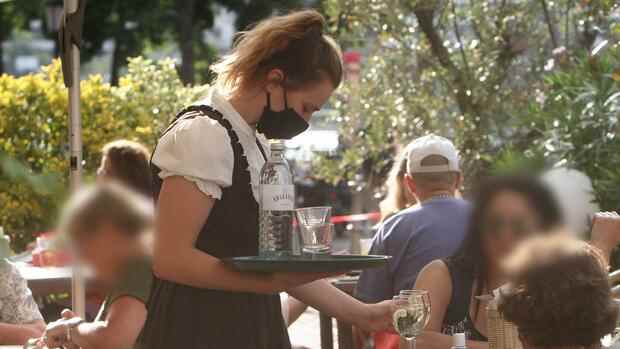The unemployment rate fell by 0.2 points to 5.1 percent in the spring.
(Photo: imago images/Ralph Peters)
Berlin The war in Ukraine has not yet had an impact on the German labor market. “However, the dangers emanating from a further escalation and, for example, delivery stops for fossil raw materials, are a burden on further economic development,” warned Daniel Terzenbach, board member of the Federal Employment Agency (BA), when presenting the current labor market data.
The spring revival and the relaxation of the corona virus have meant that the labor market has continued to recover. In March, almost 2.4 million people were registered as unemployed – 66,000 fewer than in February and 465,000 fewer than in March 2021. The unemployment rate fell by 0.2 points to 5.1 percent.
In view of the continuing supply bottlenecks and increased energy prices, however, the need for advice on short-time work is growing, said Terzenbach. By March 27, companies for 113,000 people had applied for short-time work. For February, the federal agency reported on ads for around 200,000 people.
The Ifo employment barometer, which is based on the personnel plans of around 9,000 companies and is calculated exclusively for the Handelsblatt, also points to great uncertainty about the further development of the labor market. It fell to its lowest level since May 2021 in March. He does not expect a wave of layoffs “in this critical and very uncertain situation”, commented Ifo boss Clemens Fuest on the data. But when it comes to recruitment, “many companies are holding back”.
Top jobs of the day
Find the best jobs now and
be notified by email.
In contrast, the labor market barometer of the Institute for Labor Market and Vocational Research (IAB), which is based on assessments by the local employment agencies, continued to rise in March despite the war in Ukraine. In its annual forecast, the Nuremberg Institute expects the number of people in employment to increase by 510,000 on average over the year and the number of unemployed to be 350,000 below the previous year’s figure.
An energy embargo could invalidate favorable labor market forecasts
“The prerequisite is, however, that the war does not escalate further and that the domestic economy is not even more extensively affected,” said Terzenbach. That would be the case, for example, with an embargo on Russian energy supplies.
Terzenbach also commented on the approximately 300,000 refugees from Ukraine who have now come to Germany. Among them are many traumatized people who are primarily “simply looking for protection”.
But you have to make sure that people are cared for in the best possible way. The BA board therefore spoke out in favor of granting benefits under the Second Social Code (SGB II) to refugees who have previously received support under the Asylum Seekers Benefits Act. Then the job centers could take over the care from a single source – both in terms of granting benefits and integration into the labor market.
If a quick return to the Ukraine is not possible, one must ensure that the often well-trained refugees are deployed in accordance with their qualifications, said the BA board. Working as a 24-hour nurse in German households should not be the primary career prospect for the mostly female refugees. Labor Minister Hubertus Heil (SPD) discussed integration prospects with social partners, welfare organizations and state representatives on Wednesday.
The federal agency wants to provide information about the German labor market on social media and at the arrival stations because one hears a lot about attempts to take advantage of the plight of the refugees, said Terzenbach. It is sometimes suggested to them that placement premiums have to be paid for finding a job or childcare.
The German labor market is definitely receptive. At the federal agency alone, 840,000 vacancies were reported, almost 230,000 more than a year ago, explained Terzenbach. However, the number of newly registered jobs is currently declining in view of the uncertainty caused by the Ukraine war.
The employment agency expects a deficit of around four billion euros for 2022
The employment agencies have not yet reported a wave of layoffs or bankruptcies. In the case of short-time work, however, one would have to say goodbye to earlier forecasts, said Terzenbach. The BA is currently assuming an annual average of 590,000 short-time workers.
Accordingly, the budget of the Nuremberg authority for the current year is now waste. So far, the BA had planned a deficit of 1.3 billion euros for 2022. Currently, one expects a figure of around four billion euros, said Terzenbach.
Finance Minister Christian Lindner (FDP) has only planned around one billion euros for the BA in the current federal budget – as a loan that has to be repaid. Terzenbach hopes that the traffic light coalition will change its mind here and, as in previous years, will pay its authority a subsidy so that the BA can start debt-free in the coming year.
The correction of the growth assumptions will not leave the German labor market unaffected either, warned Frank Bsirske, spokesman for the labor market and social policy for the Greens in the Bundestag. “It is more than questionable whether a decline in unemployment to the extent originally forecast can be expected.”
Production losses due to disrupted supply chains could lead to a renewed increase in short-time work. It is also important to help refugees find adequate employment and, if necessary, to qualify them. “These and all additional measures for integration into the labor market may have to be expanded and adequately funded in the future,” emphasized Bsirske.
More: Experts see good job opportunities for Ukrainian refugees – Minister Heil warns of the danger of exploitation
